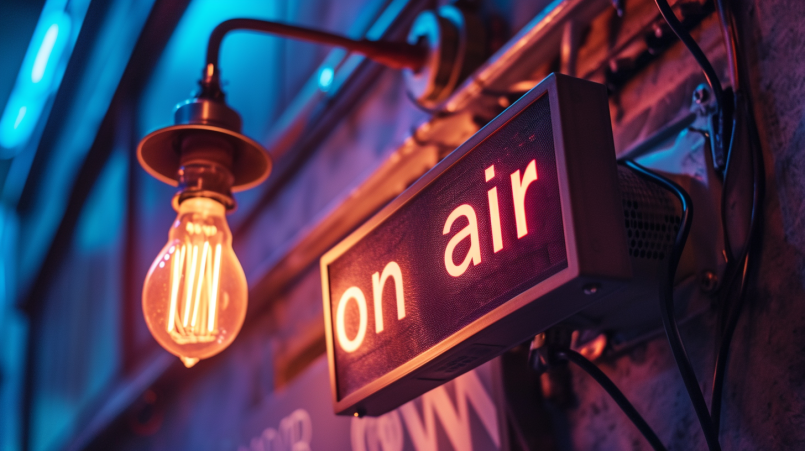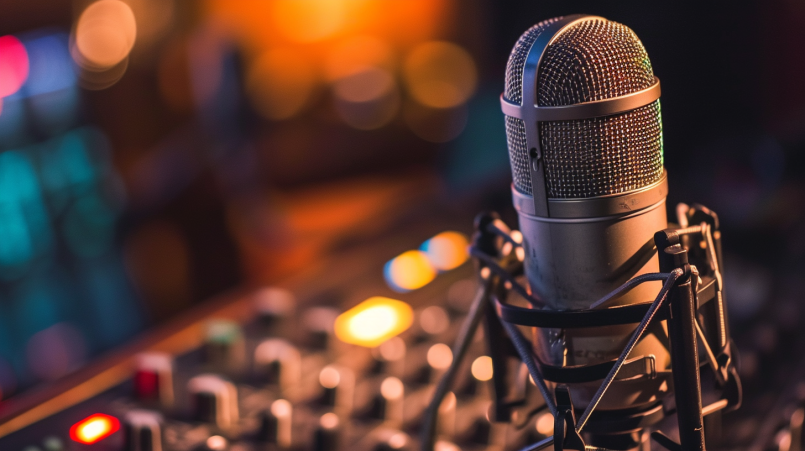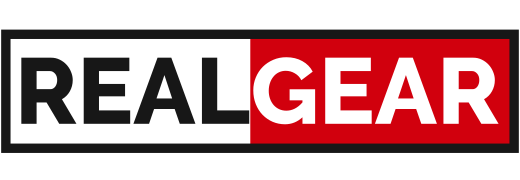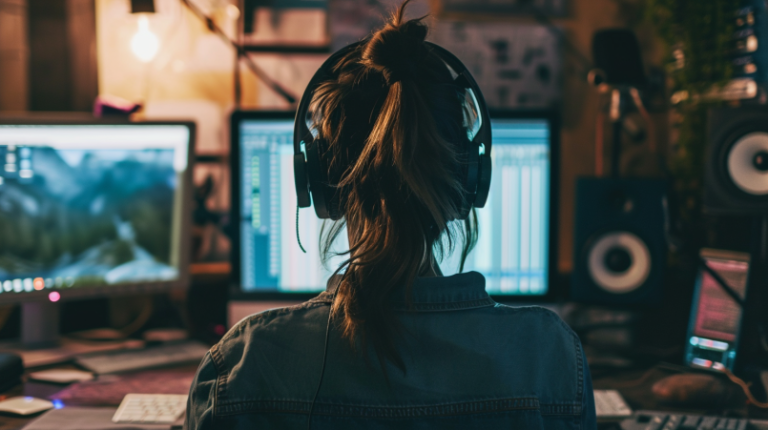This thought often crosses podcasters’ minds. But horror stories of copyright strikes often stop them from doing so.
If you are also one of those podcasters who are looking for the answer ‘Can I use copyrighted music on a podcast?’ you are at the right place.
In this article, we’ll delve into the great debate of using music in podcasts, providing insights into copyright compliance and offering practical tips for podcasters.
Playing Music on Podcasts: What’s at Stake?
Using copyrighted music without proper licensing can lead to serious legal repercussions for podcasters. It’s crucial to understand the risks associated with copyright infringement in the realm of podcasting.
Here’s a detailed look at what’s at stake when it comes to playing music on podcasts.
1. Copyright Infringement
Using copyrighted music without obtaining the necessary licenses is a clear violation of the creator’s rights. This can result in legal action, including takedown notices and potential lawsuits.
You must know that even a short snippet of a copyrighted song can be subject to infringement claims.
2. Financial Penalties
Infringing on copyright can lead to significant financial consequences. You may be required to pay damages to the copyright holder, which can amount to thousands of dollars per violation.
3. Reputational Damage
Copyright infringement can tarnish your reputation as a podcaster. Being associated with illegal or unethical practices can erode trust with both listeners and potential collaborators.
4. Loss of Podcasting Platforms
Many podcasting platforms have strict policies against using copyrighted material without proper licensing. Violating these policies can result in the removal of the podcast from the platform, leading to a loss of audience and potential revenue.
5. Limited Monetization Opportunities
Without proper licensing, you may be unable to monetize your content through advertising or sponsorship deals, as advertisers may be hesitant to partner with creators using copyrighted material unlawfully.
6. Difficulty in Building a Sustainable Brand
Building a brand around a podcast that relies on unauthorized music can be risky. It may hinder potential opportunities for your growth and collaborations in the future.
7. Legal Obligations and Liabilities
Creators who engage in copyright infringement may find themselves entangled in legal battles, which can be time-consuming, emotionally draining, and financially burdensome.
In light of these risks, it is imperative for you as a podcaster to be diligent in obtaining the necessary licenses for any music you wish to use in your content. This not only protects the rights of the original creators but also ensures a safe and sustainable path for podcasters to share their content with the world.
What Are the Rules for Using Music in a Podcast?

Podcasters enter a complex landscape when it comes to using music in their episodes. Understanding the rules and obtaining the necessary licenses is crucial for you to have a legally sound podcasting journey.
Here’s a detailed exploration of the rules governing music usage in podcasts.
Music Licensing
Music licensing is the process through which podcasters obtain legal permission to use copyrighted music in their episodes. It’s a crucial step to ensure that you as a podcaster respect the rights of the original artists and composers.
There are different types of licenses depending on how you intend to use the music. For podcasters, the most common types are synchronization licenses (for combining music with audio) and master-use licenses (for using a specific recording).
You can seek out reputable music licensing platforms that facilitate the process for podcasters. Platforms like Epidemic Sound, Audiojungle, and Artlist provide a vast selection of tracks and streamline the licensing process.
Royalty-Free and Creative Commons Music
Royalty-free music offers a cost-effective option for podcasters. Once a license is purchased, the music can be used without additional fees. Platforms like PremiumBeat and Soundstripe specialize in providing royalty-free music libraries.
Then there are Creative Commons licenses that allow artists to share their work with specific usage permissions. You can find a wealth of music on platforms like Free Music Archive and Incompetech, where artists have generously provided their work for public use.
How Much Does It Cost to Use Copyrighted Music on a Podcast?

When it comes to using copyrighted music in your podcast, understanding the costs involved is essential for budgeting and legal compliance.
Here’s a breakdown of the expenses you can expect.
Licensing Fees
The cost of licensing copyrighted music for podcast use can vary widely depending on factors such as the popularity of the track, the duration of use, and the licensing platform. On average, you can expect to invest anywhere from $20 to $100 per track.
Subscription-Based Models
Some licensing platforms offer subscription-based models that provide access to a curated library of music for a monthly fee. These subscriptions can range from $10 to $50 per month, offering an economical option for podcasters who require frequent access to music.
Custom Licensing Agreements
In some cases, you may wish to negotiate custom licensing agreements with artists or composers for specific tracks. These agreements can be more flexible but may also involve higher costs, depending on the terms negotiated.
Bundle Deals
Some licensing platforms offer bundle deals or packages that include multiple tracks at a discounted rate. These bundles can be a cost-effective option for podcasters looking to use music across multiple episodes.
By understanding the costs associated with using copyrighted music in your podcast, you can make informed decisions about budgeting and selecting the right tracks for your episodes. Remember to review the pricing structures of licensing platforms and explore alternative options to find the best fit for your podcasting needs.
8 Tips for Using Music Legally in Podcasts
Navigating copyright issues and using music legally in your podcast is essential for a smooth and compliant podcasting experience. Here are some valuable tips to help you make the right choices.
1. Obtain Proper Licensing
Always ensure you have the necessary licenses for the music you use in your podcast. Utilize reputable music licensing platforms to acquire legal rights to the tracks you wish to include.
2. Read and Understand Licensing Terms
Take the time to thoroughly read and comprehend the licensing terms associated with each track. Different licenses may have varying restrictions, and it’s crucial to abide by them.
4. Attribute Artists and Composers
Properly crediting the artists and composers of the music you use is not only a legal requirement but also a sign of respect for their creative contributions. Include clear and accurate attributions in your podcast show notes or description.
3. Keep Records of Licenses
Maintain a detailed record of all licenses obtained for the music used in your podcast. This documentation serves as evidence of your legal compliance in the event of any disputes.
5. Stay Updated on Copyright Laws
Stay informed about changes in copyright laws and regulations, as they may impact the way you use music in your podcast. Regularly review resources and seek legal advice if you have any uncertainties.
6. Use Music Consistently Across Episodes
If you choose to use music as a signature element of your podcast, maintain consistency in how and when it’s incorporated. This helps establish a recognizable brand for your podcast.
7. Explore Royalty-Free and Creative Commons Music
Consider utilizing royalty-free and Creative Commons music as cost-effective alternatives. These resources provide a wide range of music that can be used freely in podcasts, with proper attribution.
8. Seek Legal Advice if Uncertain
If you’re unsure about the legal implications of using specific music in your podcast, don’t hesitate to seek legal counsel. It’s better to be cautious and informed than risk potential copyright issues.
By following these tips, you can navigate copyright issues with confidence and ensure that you use music in your podcast legally and responsibly.
What Music Can You Play without a License?
You also have options for using music legally without obtaining traditional licenses. For that, you need to understand the concepts of royalty-free music and Creative Commons licenses. They can open up a world of possibilities.
Royalty-Free Music
Royalty-free music refers to tracks that can be used without the need for ongoing royalties or additional fees after an initial purchase. This type of music is pre-licensed for specific uses, making it an attractive option for podcasters.
Where to Find Royalty-Free Music
- PremiumBeat: This platform offers a diverse selection of high-quality royalty-free music suitable for various podcasting genres.
- Soundstripe: Soundstripe provides an extensive library of royalty-free music, with options ranging from background tracks to full compositions.
- Musicbed: While primarily known for licensing music for films, Musicbed also offers a selection of high-quality tracks for podcast use.
Advantages of Royalty-Free Music for Podcasting
- Cost-Effectiveness: With a one-time purchase, podcasters gain access to high-quality music without incurring ongoing licensing fees.
- Legal Compliance: Royalty-free music comes with clear usage rights, ensuring podcasters can use the tracks without worrying about copyright infringement.
Creative Commons Licenses
Creative Commons (CC) licenses offer a flexible approach to copyright, allowing creators to share their work with specific permissions. There are various types of Creative Commons licenses, each specifying the ways in which the work can be used.
Where to Find CC-Licensed Music for Podcasts
- Free Music Archive: This platform hosts a vast collection of music under Creative Commons licenses, providing options for different moods and genres.
- Incompetech: Incompetech offers a wide range of music compositions, all available under Creative Commons licenses.
Advantages of CC-Licensed Music for Podcasting
- Diverse Selection: Creative Commons-licensed music covers a broad spectrum of genres and styles, allowing podcasters to find the perfect fit for their content.
- Community Collaboration: Using CC-licensed music encourages collaboration and supports artists who have chosen to share their work with the public.
By exploring royalty-free music and Creative Commons-licensed options, podcasters can access a wealth of music legally and cost-effectively. These resources not only enhance the auditory experience for listeners but also demonstrate a commitment to ethical and compliant podcasting practices.
YouTube Audio Library
YouTube Audio Library is also a valuable resource for podcasters seeking music that can be used without the need for traditional licenses. This library offers a wide selection of tracks across various genres, providing you with ample options to enhance your content.
Advantages of YouTube Audio Library for Podcasting
- Accessibility: The YouTube Audio Library is easily accessible for content creators, allowing them to browse and download tracks conveniently.
- Legal Compliance: All music available in the YouTube Audio Library is cleared for use on the platform, providing podcasters with peace of mind regarding copyright issues.
- Diverse Genres and Moods: The library offers a diverse range of music, catering to different moods and genres, ensuring podcasters can find the perfect soundtrack for their content.
Utilizing the YouTube Audio Library is an excellent way for podcasters to access high-quality music for their episodes without incurring additional costs or legal complications.
Do You Really Need to Put Music in Your Podcast?
The decision to include music in your podcast ultimately boils down to personal preference and the specific goals of your content. It’s important to note that it is not mandatory to have music in your podcasts. Many successful podcasters have created engaging and captivating content without a single second of musical accompaniment.
Examples of Some Successful Music-Free Podcasts
- “The Joe Rogan Experience” by Joe Rogan: This long-form podcast features in-depth conversations with a wide range of guests, covering topics from science and technology to comedy and culture. It relies solely on engaging conversations without the use of background music.
- “Radiolab” by Jad Abumrad and Robert Krulwich: This science and philosophy podcast explores complex topics through storytelling and sound design. While it employs creative audio techniques, it does not rely on background music to engage listeners.
- “Serial” by Sarah Koenig: Known for its investigative journalism, “Serial” tells one true crime story over the course of a season. The podcast captivates listeners through its storytelling and interviews, without the need for music.
- “Science Vs” by Wendy Zukerman: This podcast tackles popular myths and trends using scientific research and analysis. It engages listeners through the presentation of facts and expert interviews, without the use of music.
- “The Tim Ferriss Show” by Tim Ferriss: Tim Ferriss conducts in-depth interviews with experts in various fields, covering subjects like productivity, health, and entrepreneurship. The podcast focuses on insightful conversations without the addition of music.
- “The Moth” by The Moth: “The Moth” features real people sharing their own personal stories in front of a live audience. The raw and authentic nature of the storytelling is the centerpiece of the podcast, without the need for musical accompaniment.
- “Reply All” by PJ Vogt and Alex Goldman: Focusing on internet culture and technology, this podcast presents stories and investigations in a highly engaging manner. It relies on storytelling, interviews, and sound design, but does not feature background music.
These podcasts demonstrate that compelling content, engaging storytelling, and insightful conversations can captivate audiences without the use of background music. Each of these shows has carved out a unique niche and attracted dedicated listeners through their content alone.
Adding Personality with Intro/Outro Music
While music-free podcasts can be highly effective, there are distinct advantages to incorporating music into your episodes. For Instance, including an intro and outro with carefully selected music can inject personality into your podcast. It creates a recognizable and memorable audio signature that sets the tone for your content.
Setting Ambiance and Tone with Background Score
Background music can serve as a powerful device to establish a specific ambiance and tone for your podcast. It can enhance the mood of discussions, create transitions, and provide a cohesive listening experience.
To sum up, the choice of whether to include music in your podcast is entirely up to you. While many successful podcasts thrive without it, music can be a valuable tool for adding personality and setting the desired atmosphere for your content.
FAQs
How Much of a Song Can You Use in a Podcast?
You can use a portion of a song in a podcast under the doctrine of fair use, typically around 10-15 seconds, for purposes of commentary, criticism, or education. However, using substantial portions or the entirety of a song without permission may constitute copyright infringement. It’s advisable to consult legal counsel if you’re uncertain about fair use implications for specific music in your podcast.
Can You Play Music on Podcasts for Free?
Yes, you can play music on podcasts for free by utilizing royalty-free music and tracks licensed under Creative Commons. These resources allow podcasters to access a wide range of music without incurring additional costs, provided they adhere to the specified licensing terms. Platforms like Free Music Archive, Incompetech, and YouTube Audio Library offer a variety of free music options for podcasters to use legally and ethically.
How Much Does It Cost to Play a Song on a Podcast?
The cost to play a song on a podcast depends on various factors, including the popularity of the track and the licensing platform’s pricing structure. Licensing fees can range from as low as $10 to as high as $500 per track. Some platforms may also offer bundle deals or subscription models, providing cost-effective options for podcasters with varying music needs. It’s crucial to ensure you have the legal rights to use the music in your podcast by obtaining the necessary licenses.
Conclusion
We hope that the above discussion helps you navigate your way around playing music in your podcast. Being in tune with the legal side of music in podcasts is a must for every podcaster. By securing the right licenses, adopting best practices, and exploring budget-friendly options, you’ll craft an engaging auditory journey for your audience, all while staying in sync with copyright rules.

